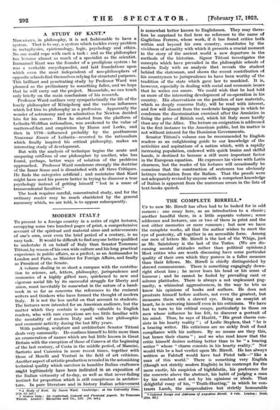A STUDY OF KANT.* NOWADAYS, in philosophy, it is not
fashionable to have a system. That is to say, a system which tackles every problem in metaphysics, epistemology, logic, psychology and ethics. No one could cope with such a task : and so the philosopher has become almost as much of a specialist as the scientist. Immanuel Kant was the founder of a prodigious system : he was a veritable encyclopaedist, and laid foundations upon which even the most independent of neo-philosophers of opposite schools find themselves relying for structural purposes. This brilliant and penetrating study by Professor Ward was planned as the preliminary to something fuller, and we hope that he will carry out the project. Meanwhile, we can touch only briefly on the main conclusions of his research.
Professor Ward outlines very sympathetically the life of the lonely philosopher of Konigsberg and the various influences which led him to philosophy as a profession. Apparently the wonder of astronomy and an admiration for Newton decided him for his career. How he started from the platform of Leibnitz-Wolffian rationalism, was awakened to the value of matters-of-fact and empiricism by Hume and Locke, and then in 1770—influenced probably by the posthumous Nouveaux Essais of Leibnitz—reverted to the rationalism which finally inspired his critical philosophy, makes an interesting study of development.
But with the analysis of technique begins the acute and unsparing criticism of one philosopher by another, who has found, perhaps, better ways of solution of the problems approached. Professor Ward condemns strongly the doctrine of the Inner Sense and is dissatisfied with all three Critiques. lie finds the categories artificial ; and maintains that Kant might have used his powers better in trying to discover a true psychology instead of getting himself " lost in a maze of transcendental faculties."
The book requires careful, concentrated study, and for the ordinary reader may be much elucidated by the general summary which, we are told, is to appear subsequently.










































 Previous page
Previous page